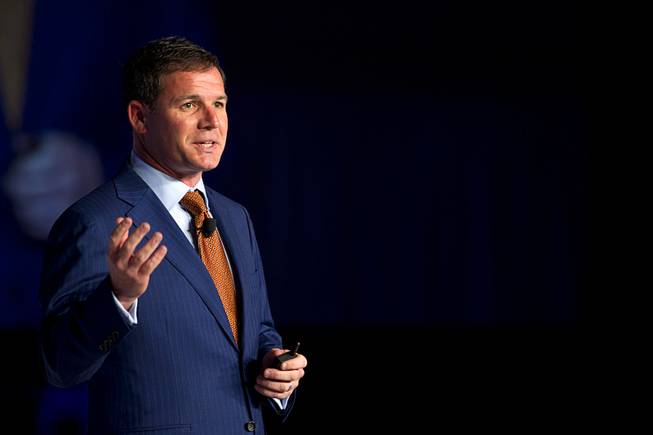
Geoff Freeman, president of the American Gaming Association, gives a “State of the Industry” address during the Global Gaming Expo on Tuesday, Sept. 29, 2015, at Sands Expo Center.
Friday, Dec. 30, 2016 | 2 a.m.
Gaming lobbyists claimed a "big win" Thursday after the IRS released new rules about how slot winnings should be reported.
“Today’s final IRS regulation is a big win not only for gaming companies and millions of casino visitors, but also for state and local governments who would have received fewer gaming tax dollars,” American Gaming Association President and CEO Geoff Freeman said.
The rules, as they were proposed last year, would have meant significant changes for people winning slot jackpots. According to the AGA, the tax regulations would be very difficult and costly for casinos to apply.
When they were first drawn up, the rules suggested that casinos use information captured by player loyalty card programs to report slot wins and losses to the IRS.
In testimony the AGA submitted to the IRS, the lobbying group pointed out that loyalty card programs were not designed for that purpose and altering them to meet IRS standards for tracking and reporting income would be too costly for gaming companies.
In addition, the AGA said players would likely resent having this information sent to the IRS and as a result, would hesitate to sign up for the loyalty programs.
The last issue the AGA had with using loyalty programs to track gambling losses and wins was accuracy. Players often lose their cards, the AGA said, sign up for additional cards and — even though casinos discourage it — share the cards with friends and family members.
As a result, the AGA said some players could inadvertently end up paying another player’s taxes or take advantage of another’s losses to reduce taxes.
Also, in the first draft of the rules, the IRS proposed lowering the threshold for when casinos had to report slot jackpots from $1,200 to $600. However, each time someone hits a $1,200 or larger jackpot, the slot machine has to be shut down while the casinos complete the IRS tax reporting procedure.
Because of this, the AGA estimated that lowering the threshold to $600 would cost a casino $300,000-$600,000 each year, depending on the size of the casino.
Both the loyalty card proposal and the lowered reporting threshold ideas were dropped from the new rules. The AGA was also happy with changes the IRS made to sections of proposed rules that spelled out how players themselves had to report winnings.

Join the Discussion:
Check this out for a full explanation of our conversion to the LiveFyre commenting system and instructions on how to sign up for an account.
Full comments policy